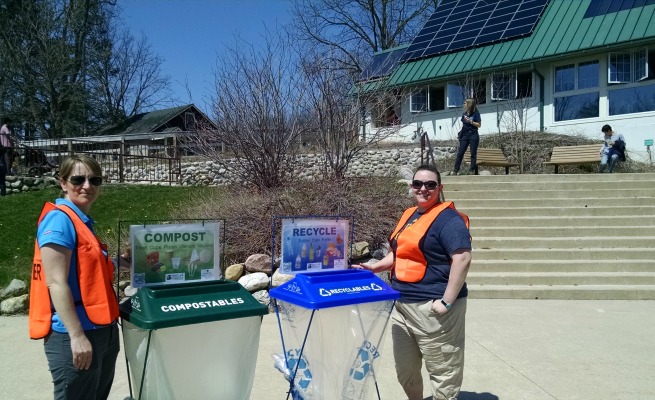
Zero Waste is a visionary solution for a sustainable future that proposes practical ways to redesign how resources and materials flow through society.
Our Goal
A commonsense alternative to the current waste disposal system: to promote clean production, prevent pollution and create communities in which all products are designed to be cycled safely back into the economy or environment.
Our Plan
Both a "back end" solution that maximizes recycling and minimizes waste, and a design principle for the future that ensures that products are made to be reused, repaired or recycled back into nature or the marketplace. Zero Waste embodies approaches that enable rapid waste reduction outcomes, breakthrough strategies rather than incremental change.
Where We Work
Ann Arbor has a 50% recovery rate, but has great opportunity to reduce its waste through a more comprehensive organics management program, and through better recycling in businesses and multi-family residences. We lead partnerships to help institute those changes. Detroit has a very new curbside recycling program, which could be greatly expanded. The City still relies on a large and polluting municipal incinerator to dispose of nearly all its waste. We are a member of Zero Waste Detroit, a coalition seeking to develop a new business model for waste, one that stops incineration, and emphasizes recycling instead.
Statewide, Michigan recovers less than 20% of its trash, despite having the most successful Bottle Bill in the country. We work with partner organizations and the Michigan Recycling Coalition to persuade the State to invest in recycling, and eventually move toward zero waste.
Urging Governor's Council to Boost Recycling
In January, the Ecology Center, Recycle Ann Arbor, and four other state environmental organizations formally urged Governor Snyder’s Recycling Council to adopt strong new standards for recycling in Michigan.
The State allocated approximately $1 million from its general fund in the 2014-15 fiscal year to help develop plans to expand recycling across the state, and the Governor’s Recycling Council is scheduled to recommend major upgrades to Michigan’s recycling infrastructure later this year. The coalition urged them to:
- establish a 50% recovery target for 2020 to raise Michigan into the top tier of states nationally
- deploy solid waste management data tracking as done is all high-performing states
- develop a sustainable funding mechanism to implement a statewide recycling program
- incentivize recycling and discourage landfilling and incineration
- increase public education
The new state funding and attention to recycling is the strongest support for recycling from Lansing in over 20 years.
Zero Waste Detroit Debunks Pro-Incineration Myths
Zero Waste Detroit Coordinator Ahmina Maxey picked apart a fiercely one-sided pro-incineration article in the New York Times with a to-the-point response, printed by the Times on January 22. Maxey wrote that the Times article did “not address the true costs of waste incineration. A study in The American Economic Review concluded that solid waste combustion systems have ‘air pollution damages larger than their value added.’ The air pollution (mercury, lead and so on) generated by these facilities places a heavy burden on the community. The hidden health an environmental costs associated with incinerator pollution mean that it is not a cheaper option than recycling. Curbside recycling and composting do not generate these same costs because they are cleaner, safer options.
“Incineration is also an environmental justice issue. Low-income and minority communities are disproportionately burdened by these environmental hazards. Detroit, a largely African-American and Latino community, is home to one of the country’s largest incinerators. The facility’s emissions contribute to Detroit’s poor air quality and high asthma death rates, about twice the state average. If the real human and environmental costs of incineration were taken into account, incineration costs would far exceed those of recycling."

